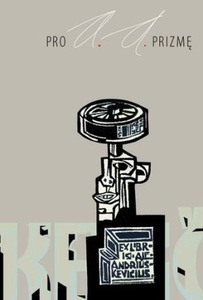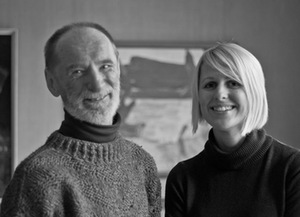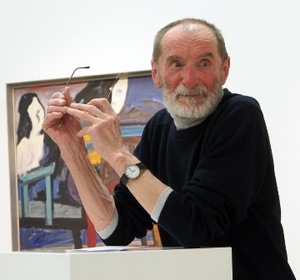“I WAS WRITTEN IN THIS WAY” 1
In brief: The twelfth book of the live classic of art criticism, essayist, translator and poet Alfonsas Andriuškevičius “Through the Prism of A.A.” was published at the beginning of the year. True, part of the copyright of the book goes to the art critic of the younger generation Jolanta Marcišauskytė–Jurašienė as the book is in the form of a conversation: A.A. (Alfonsas Andriuškevičius) answers questions presented by Jolanta. She joked during the presentation of the book that if somebody else gave questions, the book would have been similar as Alfonsas knew well what he wanted to say. Of course, such modesty is not needed because many questions turned the thread of the conversation in one or another direction, emphasised one or another accent and impelled the interlocutor to touch one or another theme more deeply, made him specify, analyse or react differently. Nonetheless, the structure of the book – its chapters and themes – were mostly offered by the hero himself.
During the latter years Alfonsas Andriuškevičius retreated from active participation in art life and vowed to literature. Therefore, he admitted that he had to be encouraged for this book for a long time. The future interlocutor and the initiator of the book, director of the Modern Art Centre Danguolė Butkienė incited A.Andriuškevičius to write the book together, and they succeeded. A.Andriuškevičius created an intriguing, informative, lively, playful and discerning document about art (and not only) life in Lithuania in the 7th-9th decades, making some notes about later periods that stretch until now. The certificate of the time is presented in the biographic, subjective and personal manner in the book.
“I am a person of ecstasies,” A.Andriuškevičius admitted several times. And he loves to state that “he has been written in this way” the most. As if he were a pure text written by somebody else. No wonder that the component of ecstasy may be felt in the texts of A.A. very well: the texts charm, flirt, shock and are full of intrigue.
Looking through his own prism, A.Andriuškevičius does not avoid elements of diary and trusts the brightest of his memories to the reader. These stories may appear very intriguing and revealing many discoveries for the generation for which Soviet years are not a personal experience but only a historical reality.
The book is illustrated abundantly. Views from personal photography archives of A.Andriuškevičius, in which we see him, his friends in daily situations as well as artworks, postcards, posters, reproductions of hand-written texts have been included into the book. The authenticity of the conversation is strengthened in this way even more. Annexes – the previously unpublished texts – form an important part of the book and replenish the context of the conversation.
A.Andriuškevičius loves answering questions. Therefore, there is no doubt: with the help of the interlocutor A. Andriuškevičius reveals himself in the loved role in the book “Through the Prism of A.A.”. The autobiographical book is a priceless value for people who appreciate the merits of the art critic to art life and who admire his personality.



